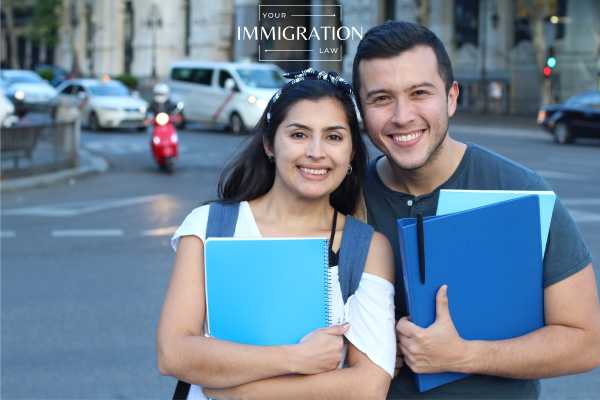Navigating the U.S. student visa process can be complex, with numerous requirements and deadlines to meet. Whether you’re applying for an F-1 visa to study at a university or an M-1 visa for vocational training, understanding the legal intricacies is crucial to a successful application. A student visa lawyer can help you navigate these challenges, ensuring that your application is complete, accurate, and submitted on time.
If you’re ready to pursue your education in the U.S. and need expert assistance with your student visa application, don’t hesitate to get help. Call an immigration lawyer today at 313-631-8080 to get the support you need and take the first step toward achieving your academic goals in the U.S.
Types of Student Visas and the Requirements for Them
The U.S. offers several types of visas for international students who wish to study in the country. The main student visas include:
F-1 Visa (Academic Student Visa)
F-1 student visas are for students pursuing a full-time academic program at an accredited U.S. college, university, high school, or language school. F-1 visa holders can remain in the U.S. for the duration of their studies and may be eligible for limited on-campus employment.
- Enrollment in a Program: You must be accepted into a full-time academic program at an accredited U.S. institution, such as a college, university, high school, or language school.
- Sufficient Financial Resources: You must demonstrate that you have enough financial resources to cover your tuition, living expenses, and other costs during your stay in the U.S.
- English Proficiency: You must prove proficiency in English or be enrolled in courses to improve your English.
- Non-Immigrant Intent: You must show that you intend to return to your home country after completing your studies, as the F-1 visa is a non-immigrant visa.
M-1 Visa (Vocational Student Visa)
The M-1 visa is for students enrolled in vocational or technical training programs at U.S. institutions. Unlike F-1 visa holders, M-1 visa holders are not permitted to work during their studies.

- Enrollment in a Vocational Program: You must be accepted into a full-time vocational or technical training program at a U.S. institution.
- Financial Support: Like the F-1 visa, you need to prove that you can financially support yourself during your studies.
- Non-Immigrant Intent: You must demonstrate that you plan to return to your home country after completing your vocational training.
J-1 Visa (Exchange Visitor Visa)
Students who want to participate in approved exchange programs, including high school and university students, interns, and researchers need to get a J1 visa. This visa also covers practical training programs and certain cultural exchange opportunities.
J-1 visa holders may be subject to a two-year home residency requirement after completing their program, depending on their specific circumstances.
- Approved Exchange Program: You must be accepted into an approved exchange program, which could include academic studies, internships, research programs, or other cultural exchange activities.
- Sufficient Funding: You need to show that you have enough financial support for the duration of your exchange program.
- Home Residency Requirement: Some J-1 visa holders must agree to return to their home country for at least two years after completing their program, depending on their specific circumstances and program type.
Each visa type also requires that you receive a Form I-20 (for F-1 and M-1 visas) or a DS-2019 (for J-1 visas) from your sponsoring institution. You will need to submit this form as part of your visa application.
The Student Visa Application Process
Applying for a student visa involves several key steps, depending on the type of visa:
- Obtain Admission to a U.S. Institution: Secure acceptance from a U.S. educational institution authorized to enroll international students. For F-1 and M-1 visas, you'll need to provide a Form I-20. For J-1 visas, you'll receive a DS-2019 form from your program sponsor.
- Pay the SEVIS Fee: The Student and Exchange Visitor Information System (SEVIS) fee must be paid for F-1, J-1, and M-1 visas. Obtain the receipt as proof of payment, which is required for your visa application.
- Complete the Visa Application Form: Fill out Form DS-160, the Online Nonimmigrant Visa Application. After submitting the form, print the confirmation page to bring to your visa interview.
- Schedule and Attend a Visa Interview: Schedule an interview at the U.S. Embassy or Consulate in your home country. Bring the necessary documents, including your passport, Form DS-160 confirmation, Form I-20 or DS-2019, SEVIS fee receipt, and proof of financial support.
- Provide Supporting Documentation: Prepare to provide evidence of your ability to pay for tuition and living expenses, ties to your home country, and intent to return after your studies. This may include bank statements, affidavits of support, and academic records.
- Attend the Interview: The consular officer will review your application during the interview. They will ask about your study plans and check your visa eligibility. Be honest and provide clear, concise answers.
By following these steps and preparing thoroughly, you can navigate the student visa application process effectively.
How Long is a Student Visa Valid?
The validity of a student visa in the U.S. depends on the type of visa and the length of the academic program:
- F-1 Visa: Valid for the duration of your studies, plus a 60-day grace period to prepare for departure or adjust your status. Your visa status ends when you finish your educational program. You must leave the U.S. within the grace period unless you applied for an extension or a change of status.
- J-1 Visa: Also valid for the duration of your exchange program, as determined by your program sponsor. Like the F-1 visa, it includes a 30-day grace period for departure or status adjustment after your program ends.
- M-1 Visa: Valid for the length of your vocational program, plus a 30-day grace period to prepare for departure.
Always check your specific visa details and consult with your school’s international office to ensure compliance with visa regulations.
Can Students Work While on a Visa?
Students in the U.S. can work while on a visa, but the opportunities and conditions vary depending on the visa type:
- F-1 Visa (Academic Students): Students with F-1 status can work on campus without additional authorization. For off-campus work, they must obtain permission through Curricular Practical Training (CPT) or Optional Practical Training (OPT). CPT allows work related to their field of study during their program. OPT provides up to 12 months of work experience either during or after their studies, with a possible 24-month extension for STEM graduates.
- J-1 Visa (Exchange Visitors): J-1 students may work on campus if authorized by their program sponsor. Off-campus work is possible but needs the sponsor's approval. It must relate to their field of study or be part of their exchange program.
- M-1 Visa (Vocational Students): M-1 students generally cannot work while studying. They may seek employment only after completing their program, with specific USCIS approval.

Students should always ensure they comply with visa regulations and obtain the necessary authorizations before working to maintain their legal status in the U.S.
Common Student Visa Legal Issues
Student visa holders in the U.S. may encounter several legal issues. Here are some of the most common challenges:
- Violation of Visa Conditions: Staying beyond the authorized period without a proper extension can lead to legal consequences, including deportation and future visa denials. Engaging in employment that is not authorized by the visa type can also result in serious legal issues, including visa revocation.
- Maintaining Full-Time Enrollment: F-1 and J-1 visa holders must maintain full-time enrollment. Dropping below full-time status without prior approval can lead to loss of visa status and potential deportation. Also, students must maintain good grades to meet their visa rules.
- Unauthorized Travel: Traveling outside the U.S. while a visa application or status adjustment is pending can cause complications. Students must ensure their visa status is current and valid before traveling.
- Change of Program or School: Switching programs or schools requires proper notification and approval. Failure to update the U.S. Citizenship and Immigration Services (USCIS) or program sponsor can lead to visa status issues. Transferring to a different school without proper procedures can cause an unauthorized stay and visa issues.
- Immigration Status Adjustments: Students must apply for visa extensions or changes of status in a timely manner. Late applications or failures to comply with the procedures can lead to legal issues.
- Misrepresentation: Submitting false information or fake documents in a visa application can lead to severe penalties. These include visa denial and future immigration issues.
It’s crucial for students to be aware of and adhere to the conditions of their visa to avoid these common legal issues. An experienced immigration attorney can you help navigate visa rules.
Secure Your Student Visa with Legal Guidance and Support
Securing a student visa is a critical step toward achieving your educational goals in the U.S., and having the right legal support can make all the difference. With the proper guidance, you can ensure that your application is handled efficiently and meets all necessary requirements.
Ready to get started on your journey? Contact a temporary visa lawyer today to receive expert assistance and ensure a smooth application process. Take the next step toward your academic success with confidence and peace of mind.